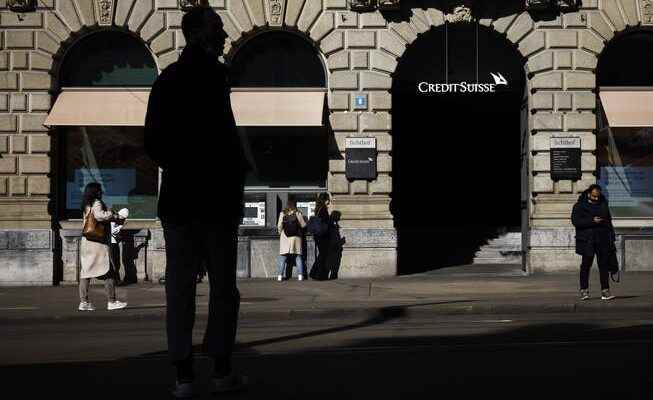CS wants to buy up to 3 billion francs of its own bonds in the next few weeks. The procedure is strongly reminiscent of another former crisis bank.
Credit Suisse wants to demonstrate financial strength by buying back bonds.
Dixit Joshi, the new chief financial officer at Credit Suisse (CS), took up his job in Zurich at a turbulent time. The banking veteran, who had last worked at Deutsche Bank for 12 years, posted a welcome greeting from Paradeplatz 8 on Linkedin at the beginning of the week – just as the rumor mill about CS was boiling particularly hot.
And lo and behold: CS is now launching a counterattack against its critics and is orienting itself on a strategy that Deutsche Bank also chose in its crisis in 2016. On Friday morning, CS announced that it would buy back up to 3 billion of its own bonds. You want to use it to optimize your own interest payments, she said.
The implied message was clear: the big bank sees its own capital position as so solid that it can afford to buy back debt. The parallels to the actions of Deutsche Bank are obvious: In February 2016, when fears were circulating in the markets that the bank might not make coupon payments, it announced that it would buy back billions of its own bonds.
If CS (like Deutsche Bank back then) can actually do without the liquid funds that it spends on buying back the bonds, the procedure makes perfect sense. This is because the CS bonds of this grade have traded a few percentage points below their issue value.
This is a class of bonds that, in the event of bankruptcy, would be fairly high up in the repayment hierarchy, just after customer funds. If even those bonds are trading at a discount, that doesn’t bode well. Investors then assume that the default risk of CS is significantly greater than zero.
Conversely, the bank now “earns” something by buying back the debt: it has to pay less than it originally borrowed from the market when the bonds were issued.
The CS offer is now valid for a few weeks. How much of the targeted CHF 3 billion it actually buys back depends on how creditors react. The bank should not earn a lot with the maneuver anyway. The focus should be on the symbolism: it should be a demonstration of one’s own strength, with an implicit seal of approval from the supervisors. One can assume that the bond purchases will not take place without the consent of the supervisory authorities, who have been looking closely over CS’s shoulder for months.
Everything now depends on whether CS, even without this outside capital, has sufficient funds to implement its strategy in the medium term without its capital ratios falling too low and the bank having to take on new debt or issue shares.
In this regard, skepticism is still widespread. The rating agency S&P left the CS rating at the same level on Thursday evening, although its outlook is still “negative”. Moody’s, in turn, assumes that CS could suffer a loss of around CHF 3 billion for 2022 as a whole. (In the first quarter, the bank reported a loss of CHF 273 million attributable to shareholders, in the second quarter it was almost CHF 1.6 billion.) Accordingly, the capital base continues to melt away for the time being. And given the difficult market environment, it is still unclear when CS will return to profitability.
The announcement shows, however, that CS has started, within the limits of its limited possibilities, to communicatively defy the prophets of doom on social media. The confirmed report that the big bank wants to sell the traditional Hotel Savoy in Zurich can be interpreted in a similar way, which, if successful, would flush several hundred million francs into the coffers. So far, CS has hardly ever commented on rumors and has always referred to October 27, when it intends to present the announced new strategy and structure in addition to the quarterly results.
